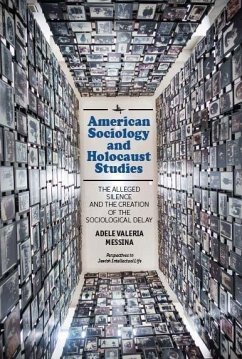American Sociology and Holocaust Studies (eBook, PDF)
The Alleged Silence and the Creation of the Sociological Delay


Alle Infos zum eBook verschenken

American Sociology and Holocaust Studies (eBook, PDF)
The Alleged Silence and the Creation of the Sociological Delay
- Format: PDF
- Merkliste
- Auf die Merkliste
- Bewerten Bewerten
- Teilen
- Produkt teilen
- Produkterinnerung
- Produkterinnerung

Hier können Sie sich einloggen

Bitte loggen Sie sich zunächst in Ihr Kundenkonto ein oder registrieren Sie sich bei bücher.de, um das eBook-Abo tolino select nutzen zu können.
The first résumé in English of up-to-date research on post-Holocaust Sociology. A single volume full of relevant tips to help a wide audience rethink the genocide in sociological tools and investigate the history of the same Sociology. Adele Valeria Messina is an Italian historian and a member of the Research Laboratory in History, Philosophy, and Politics at the Department of Political and Social Sciences of the Calabria University where she received her doctorate in Politics, Society and Culture in 2013. Her research interests include the Holocaust, Sociology, and anti-Semitism.
- Geräte: PC
- ohne Kopierschutz
- eBook Hilfe
- Größe: 2.5MB
- FamilySharing(5)
![Jewish Child Soldiers in the Bloodlands of Europe (eBook, PDF) Jewish Child Soldiers in the Bloodlands of Europe (eBook, PDF)]() David M. RosenJewish Child Soldiers in the Bloodlands of Europe (eBook, PDF)42,95 €
David M. RosenJewish Child Soldiers in the Bloodlands of Europe (eBook, PDF)42,95 €![Jewish Culture and Urban Form (eBook, PDF) Jewish Culture and Urban Form (eBook, PDF)]() Malgorzata HanzlJewish Culture and Urban Form (eBook, PDF)41,95 €
Malgorzata HanzlJewish Culture and Urban Form (eBook, PDF)41,95 €![Museums in Israel after the Holocaust (eBook, PDF) Museums in Israel after the Holocaust (eBook, PDF)]() Shir Gal KochaviMuseums in Israel after the Holocaust (eBook, PDF)42,95 €
Shir Gal KochaviMuseums in Israel after the Holocaust (eBook, PDF)42,95 €![Remembering the Holocaust (eBook, PDF) Remembering the Holocaust (eBook, PDF)]() Jeffrey C. AlexanderRemembering the Holocaust (eBook, PDF)25,95 €
Jeffrey C. AlexanderRemembering the Holocaust (eBook, PDF)25,95 €![Holocaust Studies (eBook, PDF) Holocaust Studies (eBook, PDF)]() Steven T. KatzHolocaust Studies (eBook, PDF)44,95 €
Steven T. KatzHolocaust Studies (eBook, PDF)44,95 €![Representations of Anne Frank in American Literature (eBook, PDF) Representations of Anne Frank in American Literature (eBook, PDF)]() Rachael McLennanRepresentations of Anne Frank in American Literature (eBook, PDF)47,95 €
Rachael McLennanRepresentations of Anne Frank in American Literature (eBook, PDF)47,95 €![The Last Ghetto (eBook, PDF) The Last Ghetto (eBook, PDF)]() Anna HájkováThe Last Ghetto (eBook, PDF)12,95 €
Anna HájkováThe Last Ghetto (eBook, PDF)12,95 €-
-
-
Dieser Download kann aus rechtlichen Gründen nur mit Rechnungsadresse in A, B, BG, CY, CZ, D, DK, EW, E, FIN, F, GR, HR, H, IRL, I, LT, L, LR, M, NL, PL, P, R, S, SLO, SK ausgeliefert werden.
- Produktdetails
- Verlag: Academic Studies Press
- Seitenzahl: 540
- Erscheinungstermin: 7. Februar 2017
- Englisch
- ISBN-13: 9781618115485
- Artikelnr.: 56998788
- Verlag: Academic Studies Press
- Seitenzahl: 540
- Erscheinungstermin: 7. Februar 2017
- Englisch
- ISBN-13: 9781618115485
- Artikelnr.: 56998788
- Herstellerkennzeichnung Die Herstellerinformationen sind derzeit nicht verfügbar.
1960s 1.1. A Preliminary 1.2. A Totalitarian Order 1.3. Reflections on Anti-Semitism: Frankfurt School Reactions to Nazi Atrocities 1.4. An Open Case: Talcott Parsons and National Socialism, from Active Political Engagement to the Years of Silence 1.4.1. Parsons
s Seven Published Papers 1.4.2. The Seven Unpublished Writings 1.4.3. Years of Silence (1946
1948) 1.4.4. The Parsons Controversy over His
Role
in Bringing Nazi Sympathizers to the U.S. 1.5. The German Army in Shils and Janowitz 1.6. The NSDAP and the Consensus: Between Heberle and Lipset 1.6.1. The Modern Society behind the Political Man 1.6.2. Lipset
s Election Analysis 1.7.
Good People and Dirty Work
: Hughes 1.7.1. Beyond the Banality of Evil 1.7.2. The Theory of Flow and Empirical Evidence at the Basis of Hughes
s Thinking 1.7.3. Halfway between Modern Industry and National Socialist Society 1.7.4.
Good People
according to Critical Essays and Reviews 1.7.5.
The Gleichshaltung
1.7.6. A Self-Coördination Case 1.7.7. Hughes
s Delay Roots in the American Sociological Tradition 1.8. Summary 2. The Destruction of the Jews in a Sociological Perspective during the 1970s 2.1. Preface 2.2. Auschwitz in the Light of Anna Pawe
czy
ska: From Violence to Values 2.2.1. Inside the Time and Space of Auschwitz 2.2.2. The Hodological Space in the Structure of Terror 2.2.3. Resistance as Defense of the Dimension of Life by Group Dynamics 2.2.3.1. Resistance as Communication 2.2.3.2. The Market as Defense Mechanism Par Excellence 2.2.3.3. Resistance as Movement and Organization 2.2.4. The Institutions of the Criminal State 2.2.5. Auschwitz as Modern State 2.3. Jews in Poland 2.3.1. Twenty-one Years after Celia Heller 2.3.1.2. Polish Nationalism during the Soviet Occupation 2.3.1.3. Polish Collaboration during the German Occupation 2.4. Injustice in the Eyes of German Workers 2.4.1. An Obedient Proletariat 2.4.2.
Was du für Volk und Heimat tust, ist immer recht getan!
2.4.3. The Early Nazists for Abel, Merkl, and Moore 2.4.4. Surrender to Authority in Concentration Camps 2.5. How Many Victims of the Holocaust? 2.5.1. Within a Statistical Framework 2.5.2. Space and Times as Coordinates 2.5.3. Moral Solidarity 2.5.4. Jewish Victims 2.5.5. International Debate after Publication 2.5.6. An Intellectual Diatribe: Horowitz and Fein 2.5.7. Ben-Baruch
s Position 2.5.8. Accounting for Genocide and the Sociological Tradition 2.6. Summary 3. Toward a Sociology of Genocide, 1980
1989 3.1. Genocide as a Government Solution during the 1980s 3.2. The Significance of Genocide 3.3. When States Sponsor Genocide 3.3.1. Between Nation-State and International Law: The Role of International Organizations 3.4. A General Theory on State-Sponsored Genocide: Baum and Horowitz 3.4.1. The Holocaust as Crime of State in Sofsky 3.4.2. The Organization of Work 3.5. The Sociological Frame of Katz 3.5.1. Individuals and the Factory System 3.6. Tec and Sociological Categories of Genocide 3.6.1. The Meaning of Resistance 3.7.
The Holocaust as the test of modernity
3.7.1. Between England and Poland 3.7.2. From Memories of Class to Modernity and the Holocaust 3.7.3. Suffering in Society 3.7.4. The Holocaust as a Product of Modernity 3.7.5. His Sociological Lesson 3.7.6. A Samizdat Phenomenon 3.7.7. Some Literary Critics 3.7.8. An Open Problem on the Modernity Thesis 3.8. Summary 4. The Problem of the Holocaust after 1989 4.1. After the Fall of the Berlin Wall 4.2. From Collective National Memory to Cosmopolitan Memory 4.2.1. Levy and Sznaider in the Wake of Ulrich Beck 4.3. Between Memory and Political Acting: The Holocaust in Global Society 4.4. Alexander and Durkheim:
What Holds Society Together?
4.4.1.
as Interpretation of the Human Condition 4.4.2. Trauma Theory: From Cultural Trauma to Universal Value 4.5. Genre Studies and the Jewish Question 4.6. The Post-Holocaust Sociology of the Social Movements 4.6.1. The Warsaw Ghetto Uprising as Social Movement 4.6.2. The Conditions of Collective Action 4.6.3. Leadership Question: Three Cases in Comparison 4.6.4. The Geography of Resistance in Warsaw, Vilna, and
ód
4.7. Anti-Semitism in Brustein 4.8. Summary Conclusion: The Alleged Delay Watershed Events Bibliography Index
1960s 1.1. A Preliminary 1.2. A Totalitarian Order 1.3. Reflections on Anti-Semitism: Frankfurt School Reactions to Nazi Atrocities 1.4. An Open Case: Talcott Parsons and National Socialism, from Active Political Engagement to the Years of Silence 1.4.1. Parsons
s Seven Published Papers 1.4.2. The Seven Unpublished Writings 1.4.3. Years of Silence (1946
1948) 1.4.4. The Parsons Controversy over His
Role
in Bringing Nazi Sympathizers to the U.S. 1.5. The German Army in Shils and Janowitz 1.6. The NSDAP and the Consensus: Between Heberle and Lipset 1.6.1. The Modern Society behind the Political Man 1.6.2. Lipset
s Election Analysis 1.7.
Good People and Dirty Work
: Hughes 1.7.1. Beyond the Banality of Evil 1.7.2. The Theory of Flow and Empirical Evidence at the Basis of Hughes
s Thinking 1.7.3. Halfway between Modern Industry and National Socialist Society 1.7.4.
Good People
according to Critical Essays and Reviews 1.7.5.
The Gleichshaltung
1.7.6. A Self-Coördination Case 1.7.7. Hughes
s Delay Roots in the American Sociological Tradition 1.8. Summary 2. The Destruction of the Jews in a Sociological Perspective during the 1970s 2.1. Preface 2.2. Auschwitz in the Light of Anna Pawe
czy
ska: From Violence to Values 2.2.1. Inside the Time and Space of Auschwitz 2.2.2. The Hodological Space in the Structure of Terror 2.2.3. Resistance as Defense of the Dimension of Life by Group Dynamics 2.2.3.1. Resistance as Communication 2.2.3.2. The Market as Defense Mechanism Par Excellence 2.2.3.3. Resistance as Movement and Organization 2.2.4. The Institutions of the Criminal State 2.2.5. Auschwitz as Modern State 2.3. Jews in Poland 2.3.1. Twenty-one Years after Celia Heller 2.3.1.2. Polish Nationalism during the Soviet Occupation 2.3.1.3. Polish Collaboration during the German Occupation 2.4. Injustice in the Eyes of German Workers 2.4.1. An Obedient Proletariat 2.4.2.
Was du für Volk und Heimat tust, ist immer recht getan!
2.4.3. The Early Nazists for Abel, Merkl, and Moore 2.4.4. Surrender to Authority in Concentration Camps 2.5. How Many Victims of the Holocaust? 2.5.1. Within a Statistical Framework 2.5.2. Space and Times as Coordinates 2.5.3. Moral Solidarity 2.5.4. Jewish Victims 2.5.5. International Debate after Publication 2.5.6. An Intellectual Diatribe: Horowitz and Fein 2.5.7. Ben-Baruch
s Position 2.5.8. Accounting for Genocide and the Sociological Tradition 2.6. Summary 3. Toward a Sociology of Genocide, 1980
1989 3.1. Genocide as a Government Solution during the 1980s 3.2. The Significance of Genocide 3.3. When States Sponsor Genocide 3.3.1. Between Nation-State and International Law: The Role of International Organizations 3.4. A General Theory on State-Sponsored Genocide: Baum and Horowitz 3.4.1. The Holocaust as Crime of State in Sofsky 3.4.2. The Organization of Work 3.5. The Sociological Frame of Katz 3.5.1. Individuals and the Factory System 3.6. Tec and Sociological Categories of Genocide 3.6.1. The Meaning of Resistance 3.7.
The Holocaust as the test of modernity
3.7.1. Between England and Poland 3.7.2. From Memories of Class to Modernity and the Holocaust 3.7.3. Suffering in Society 3.7.4. The Holocaust as a Product of Modernity 3.7.5. His Sociological Lesson 3.7.6. A Samizdat Phenomenon 3.7.7. Some Literary Critics 3.7.8. An Open Problem on the Modernity Thesis 3.8. Summary 4. The Problem of the Holocaust after 1989 4.1. After the Fall of the Berlin Wall 4.2. From Collective National Memory to Cosmopolitan Memory 4.2.1. Levy and Sznaider in the Wake of Ulrich Beck 4.3. Between Memory and Political Acting: The Holocaust in Global Society 4.4. Alexander and Durkheim:
What Holds Society Together?
4.4.1.
as Interpretation of the Human Condition 4.4.2. Trauma Theory: From Cultural Trauma to Universal Value 4.5. Genre Studies and the Jewish Question 4.6. The Post-Holocaust Sociology of the Social Movements 4.6.1. The Warsaw Ghetto Uprising as Social Movement 4.6.2. The Conditions of Collective Action 4.6.3. Leadership Question: Three Cases in Comparison 4.6.4. The Geography of Resistance in Warsaw, Vilna, and
ód
4.7. Anti-Semitism in Brustein 4.8. Summary Conclusion: The Alleged Delay Watershed Events Bibliography Index







